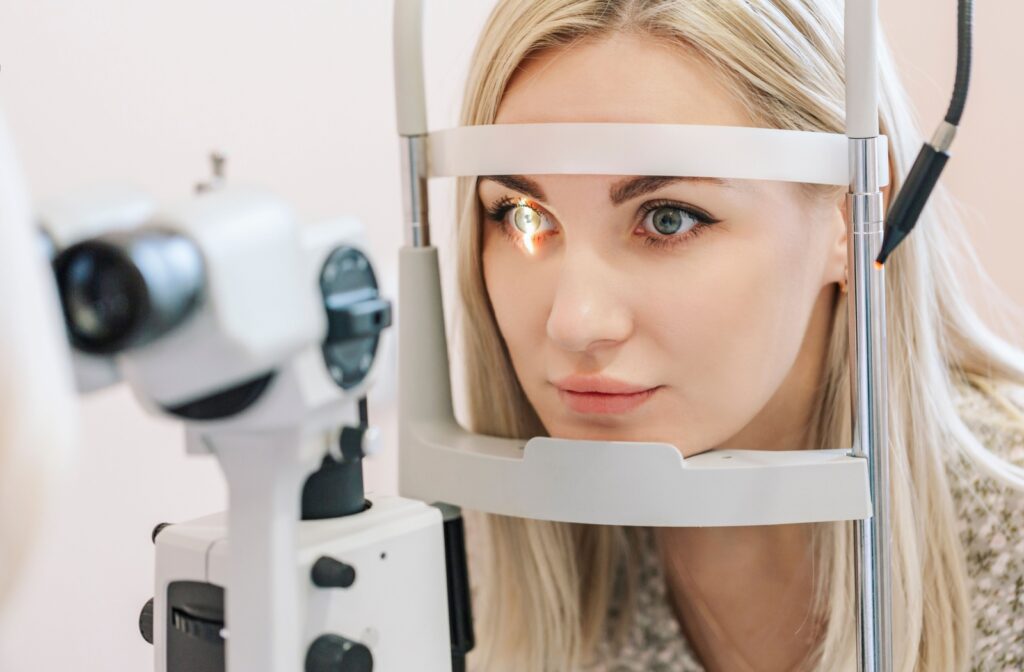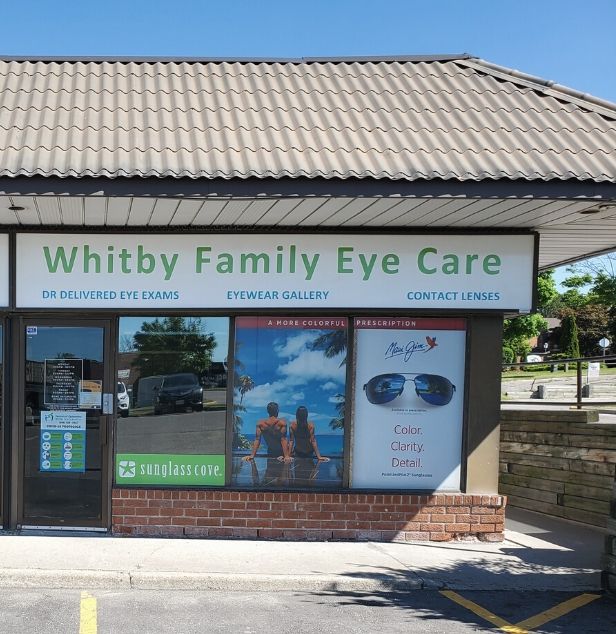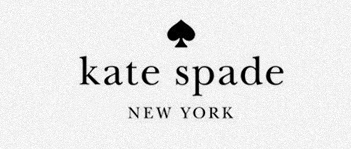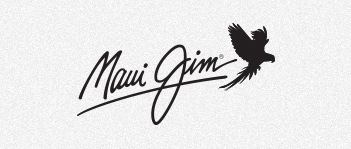Good vision doesn’t come with a lifetime warranty; it’s something we have to maintain. Regular eye exams are essential for protecting your family’s vision and eye health. And these exams are more than just reading letter charts. A thorough eye health exam will provide insight into your overall health and help us detect eye diseases before they become a vision threatening problem.
How often you should get an eye exam generally depends on your age. Adults, children, and seniors should have annual eye health exams.
Recommended Eye Exam Schedule
The Canadian Optometric Association (COA) recommends the following schedule for eye exams:
- Children should get their first eye exam between 6–9 months
- Children ages 3–5 should have another exam before starting school
- Youths ages 6–19 need annual exams
- Adults ages 20–64 need exams at least every 1-2 years
- Ages 65+ need exams annually
These are general guidelines. However, your eyes are unique, so your personal schedule might differ from your neighbour’s. Some people are considered “high-risk,” so even if they have no vision concerns and are in the 20–64 range they need comprehensive eye exams yearly.
What Happens During an Eye Exam?
Now you know how often you should get an eye exam, but why are regular eye health exams so important? It’s much more than just simply reading a letter chart. A comprehensive health exam involves a range of tests that give an overall view of your eye and general health.
If it’s been a while since you last stopped in, we’re happy to refresh you on what to expect:
Visual Acuity Test
A visual acuity test allows your doctor to measure how well you can see. It’s usually done with a chart projected onto a screen featuring letters or symbols.
If your doctor believes you may have a refractive error, such as myopia (nearsightedness), hyperopia (farsightedness ), or astigmatism, they can get a precise measurement with the refraction test. This test is similar to the visual acuity test, where you read off letters or symbols from a chart but with a twist.
This time, you’ll look through a phoropter—a mask-like device that allows your doctor to switch between many combinations of different lenses. This process helps us determine your unique prescription to optimize your vision.
Retinal Exam
Examining your retina—the thin layer of cells at the back of your eye—can reveal a great deal about your overall health. Conditions like diabetes and high blood pressure can affect the tiny blood vessels in your retina, potentially resulting in vision loss.
With advanced imaging technology, your doctor will obtain detailed scans of your retina and check for any signs of trouble in a thorough and noninvasive way.
Glaucoma Testing
Glaucoma is a degenerative eye disease that permanently damages the optic nerve. It’s also one of the leading causes of blindness and generally presents with no symptoms in the early stages. It is impossible to detect glaucoma without a comprehensive eye health exam.
While there are many types of glaucoma, they all have in common an imbalance of intraocular pressure (IOP), or the pressure inside the eye. You cannot feel if your IOP is abnormal. It is a silent thing. Your doctor will gently measure your IOP with a device known as a tonometer. This is one piece of the puzzle your doctor will use to detect glaucoma while it’s still developing in the early stages.
How to Know If You Should See Your Optometrist
So, you’ve had your comprehensive eye health exam, a few months have passed and something about your eyes changes. Don’t ignore warning signs about your vision. Here’s a friendly checklist to help you recognize those moments when your eyes are asking for a little extra attention:
- Vision changes: If you notice blurriness, difficulty reading signs or books at your usual distance, or if things just don’t seem as clear as they were before, it’s time to come in.
- Eye strain or fatigue: Do you spend a lot of time in front of screens? It might be more than digital fatigue if your eyes feel tired or strained after a typical day.
- Sensitivity to light: If you are squinting in moderate light or experiencing discomfort when moving from dark to lit environments, it should be checked out.
- Seeing halos around lights: This can be a sign of developing vision issues, particularly if you notice it more at night.
- Trouble with night vision: Difficulty seeing or driving in the dark is a key indicator that something has changed like cataracts..
- Eye pain or redness: Persistent pain or redness in the eyes is not something to overlook, as it could indicate dry eyes or other serious issues like abrasions and infections.
- Double vision: Seeing double, whether constantly or sporadically, a professional eye exam is needed ASAP.
Getting Help After Your Exam
Once your exam is done, there’s still plenty your optometrist can help you with!
If you’re looking for new frames because your old ones are getting uncomfortable or want to upgrade your style, our team can help with a personalized glasses fitting.
Knowing how to find frames that compliment your face shape takes a bit of art and science. Eyewear stylists at your optometrist’s Eyewear Gallery know how to pick the frame shapes that flatter. Square shaped faces often do best with softer frame shapes with upward curves to balance their features, while square or rectangular frames add interesting angles for round faces.
We also advise you on the lens designs that will optimize your vision, as well as coatings, filters, and tints that will reduce eye fatigue while working on screens or reduce glare while driving. There are so many options! We will guide you through them and design the eyewear that is perfect for you.
See You At Your Eye Exam!
Your family’s vision isn’t something to put off. Eye exams can help you stay ahead of issues and see the world in all its beauty. Book your appointment at Whitby Family Eye Care today!







